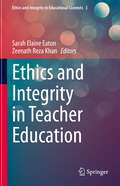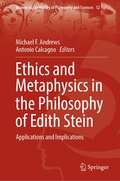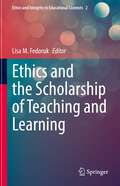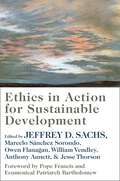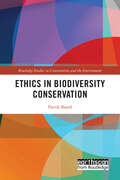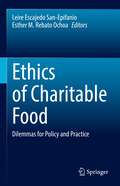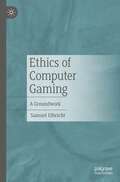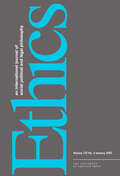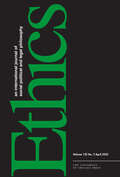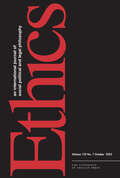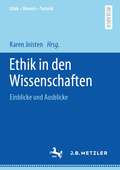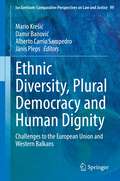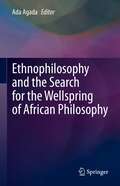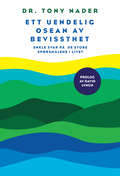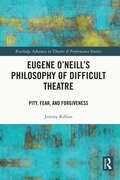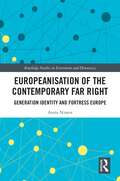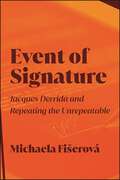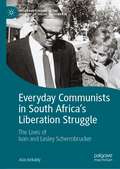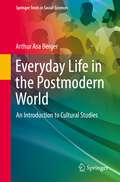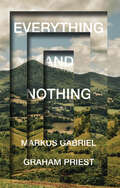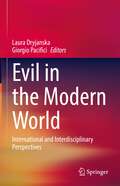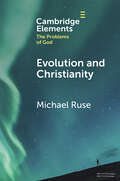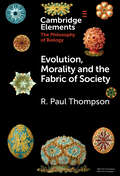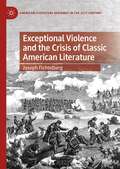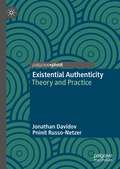- Table View
- List View
Ethics and Integrity in Teacher Education (Ethics and Integrity in Educational Contexts #3)
by Sarah Elaine Eaton Zeenath Reza KhanThis book addresses issues related to ethics and integrity in teacher training. Authors pay special attention to the role ethics plays in teaching practice and the importance of establishing expectations for students to learn with integrity from a young age. The book celebrates global perspectives on ethics and integrity for pre-service teachers, acknowledging that although some aspects of ethics are universal, the ways in which these are implemented can vary. Contributors present original research, case studies, and recommendations for practice and teaching. The book draws on a range of theoretical and conceptual foundations including applied ethics, academic integrity, and moral education.
Ethics and Metaphysics in the Philosophy of Edith Stein: Applications and Implications (Women in the History of Philosophy and Sciences #12)
by Antonio Calcagno Michael F. AndrewsThis book is dedicated to Edith Stein (1891–1942), who is known widely for her contributions to metaphysics. Though she never produced a dedicated work on questions of ethics, her corpus is replete with pertinent reflections. This book is the first major scholarly volume dedicated to exploring Stein’s ethical thought, not only for its wide-ranging content, from her earlier to later works, but also for its applications to such fields as psychology, theology, education, politics, law, and culture. Leading international scholars come together to provide a systematic account of Stein’s ethics, highlighting its relation to Stein’s highly developed and complex metaphysics. Questions about the good, evil, the rights and ethical comportment of the person, the state, and feminism are addressed. The book appeals to scholars interested in the history of philosophical and ethical thought
Ethics and the Scholarship of Teaching and Learning (Ethics and Integrity in Educational Contexts #2)
by Lisa M. FedorukThis book addresses issues related to ethics and the scholarship of teaching and learning, and pays special attention to ethical concerns and experiences that have arisen from engaging in Scholarship of Teaching and Learning (SoTL) work. The book draws on a range of research projects, theoretical frameworks and narrative experiences to provide multiple perspectives of how meaning is made of research ethics in SoTL, academic community and REB partnerships, experiences of Students as Partners in SoTL, and ethically-minded approaches to teaching, learning and inquiry. Specifically, this edited book includes ethical practices that have become increasingly expansive in an ever-evolving academic environment such as navigating pandemic pedagogy and data ownership due to increased online content. In addition, contributions pertaining to academic community partnerships between REBs and faculty detail realistic narratives and lessons learned about how higher education can become more equitable, diverse and inclusive. Subsequently, decolonial ethics for teaching and learning in higher education, as well as participatory parity, exemplify the need for SoTL practitioners to be responsive to the social and cultural realities of a global context in ways that address social inequities and social responsibility. Relational ethics by way of student perspectives on vulnerability and classroom-based SoTL research underscore the need for students to be taught about their own agency as a means of providing student voice within SoTL work. Lastly, this book celebrates how ethically-minded approaches to teaching, learning and inquiry uncover strategies and pedagogy that encourage concepts such as ethical imagination and systems and design thinking practices.
Ethics in Action for Sustainable Development
by Sachs, Jeffrey D.; Sorondo, Marcelo Sánchez; Flanagan, Owen; Vendley, William; Annett, Anthony; Thorson, JesseThe Sustainable Development Goals, adopted by the United Nations in 2015, comprise an ambitious and sweeping agenda that unites economic, social, and environmental aims. What resources do the world’s religious and secular traditions offer in support of these objectives? Which principles do these traditions hold in common, and how can these shared values help advance global goals?This book presents an in-depth and deeply engaged conversation among interfaith religious leaders and interdisciplinary scholars and practitioners in pursuit of an ethical consensus that could ground sustainable development efforts. Drawing on more than two years of close-knit discussions convened by Jeffrey D. Sachs and Marcelo Sánchez Sorondo, it offers an extensive and inclusive vision of how to promote human flourishing. The book features theological, philosophical, and ethical deliberations of great diversity and depth on the challenges of sustainable development, addressing questions of poverty, environmental justice, peace, conflict, and the future of work. It includes consensus statements on the moral imperatives of sustainable development, introductions to seven major religious traditions and their conceptions of the common good, and thematic reflections. Wide-ranging and urgent, this book represents a major contribution to interreligious dialogue and to the articulation of a shared global ethics.The book features a foreword by Pope Francis and Ecumenical Patriarch Bartholomew.
Ethics in Biodiversity Conservation (Routledge Studies in Conservation and the Environment)
by Patrik BaardThis book examines the role of ethics and philosophy in biodiversity conservation. The objective of this book is two-fold: on the one hand it offers a detailed and systematic account of central normative concepts often used, but rarely explicated nor justified, within conservation biology. Such concepts include ‘values’ (both intrinsic, instrumental, and, more recently, relational), ‘rights’, and ‘duties’. The second objective is to emphasize to environmental philosophers and applied ethicists the many interesting decision-making challenges of biodiversity conservation. The book argues that a nuanced account of instrumental values provides a powerful tool for reasoning about the values of biodiversity. It also scrutinizes relational values, the concept of rights of nature, and risk, and show how moral philosophy proves indispensable for these concepts. Consequently, it engages with recent suggestions on normative aspects of biodiversity conservation, and show the need for moral philosophy in biodiversity conservation. The overriding aim of this book is to provide conservation biologists and policy-makers with a systematic overview of concepts and assessments of the reasons for reaching prescriptive conclusions about biodiversity conservation. This will prove instrumental in clarifying the role of applied ethics and a refined understanding of the tools it can provide. This title will be of interest to students and scholars of conservation biology, conservation policy, environmental ethics and environmental philosophy.
Ethics of Charitable Food: Dilemmas for Policy and Practice
by Leire Escajedo San-Epifanio Esther M. Rebato OchoaThis book provides an in-depth analysis of different dimensions of contemporary food charity. It does so against the background of an increasing number of food banks and other forms of food philanthropy. The book examines the incongruity of considering food donation as an expression of 'pure altruism'. Taking into account the dignity and rights of people, it addresses how hunger is seen and explained in rich countries and how philanthropy and democracy coexist. It looks at the relationship that exists between religious traditions and the current food donation narrative. It discusses the risks of stigmatizing food recipients, and clarifies ways to better deal with food poverty and food waste. Paradoxically, food insecurity and food waste have grown exponentially in the last decade. More and more people are not able to access food properly. The amount of perfectly edible food that is discarded also grows. The consolidation of democracies, welfare policies, and economic growth do not guarantee that all citizens can meet their basic needs in the so-called rich countries. This book analyses the current state of affairs and presents facts and reflections from diverse sources and from a cross-disciplinary perspective.
Ethics of Computer Gaming: A Groundwork
by Samuel UlbrichtDespite the increasing number of gamers worldwide, the moral classification of computer gaming marks an as yet unsolved riddle of philosophical ethics. In view of the explosive nature of the topic in everyday life (as seen in various debates about rampages), it is obvious that a differentiated professional clarification of the phenomenon is needed: Can playing computer games be immoral?To answer this question, the author first discusses what we do at all when we play computer games: What kind of action are we talking about? The second step is a moral classification that reveals whether (and if so, why) some cases of computer gaming are morally problematic. The considerations made here provide a fundamental insight into the normative dimension of computer gaming. Samuel Ulbricht studied philosophy and German studies in Stuttgart, where he passed his first state examination. He completed his second state examination in Heidelberg. For his final thesis on the ethics of computer gaming, he received the "Prize of the Friends of the University of Stuttgart". His current research focuses on normative differences in moral theories, problem areas in applied ethics, the aesthetics and ethics of computer games and the ethics of education and teaching. He currently works at the Johannes Gutenberg University of Mainz.This book is a translation of the original German 1st edition Ethik des Computerspielens by Samuel Ulbricht, published by J.B. Metzler, an imprint of Springer-Verlag GmbH Germany, part of Springer Nature in 2020. The translation was done with the help of artificial intelligence (machine translation by the service DeepL.com). A subsequent human revision was done primarily in terms of content, so that the book will read stylistically differently from a conventional translation. Springer Nature works continuously to further the development of tools for the production of books and on the related technologies to support the authors.
Ethics, volume 132 number 2 (January 2022)
by EthicsThis is volume 132 issue 2 of Ethics. Ethics features scholarly work that covers a range of topics pertaining to moral, political, and legal philosophy from a variety of intellectual perspectives, including social and political theory, law, and economics. Articles in the journal present new theories, apply theory to contemporary moral issues, and focus on historical works that have significant implications for contemporary theory. In addition to major articles, Ethics publishes critical discussions, symposia, review essays, and book reviews.
Ethics, volume 132 number 3 (April 2022)
by EthicsThis is volume 132 issue 3 of Ethics. Ethics features scholarly work that covers a range of topics pertaining to moral, political, and legal philosophy from a variety of intellectual perspectives, including social and political theory, law, and economics. Articles in the journal present new theories, apply theory to contemporary moral issues, and focus on historical works that have significant implications for contemporary theory. In addition to major articles, Ethics publishes critical discussions, symposia, review essays, and book reviews.
Ethics, volume 133 number 1 (October 2022)
by EthicsThis is volume 133 issue 1 of Ethics. Ethics features scholarly work that covers a range of topics pertaining to moral, political, and legal philosophy from a variety of intellectual perspectives, including social and political theory, law, and economics. Articles in the journal present new theories, apply theory to contemporary moral issues, and focus on historical works that have significant implications for contemporary theory. In addition to major articles, Ethics publishes critical discussions, symposia, review essays, and book reviews.
Ethik in den Wissenschaften: Einblicke und Ausblicke (Ethik – Mensch - Technik)
by Karen JoistenDas vorliegende Buch gewährt Einblicke und Ausblicke in unterschiedliche Disziplinen der Wissenschaft und die mit ihnen einhergehenden ethischen Probleme und Fragestellungen. Das Buch richtet sich neben dem akademischen Fachpublikum vor allem auch an ein breiteres Publikum, da Ethik nur nachhaltig sein kann, wenn auch die breite Bevölkerung sich kompetent und engagiert ethischen Problemen und Fragen stellt und in den Diskurs einbringt.Die Themen, die in diesem Band diskutiert werden, beziehen sich auf: Ethos und Pathos der Architektur, ethische Aspekte des Regierens, die Digitale Transformation, eine philosophische Unterscheidung von Roboter und Mensch, Grenzen der Medizin, ethische Kriterien der Technikfolgenabschätzung, ethische Entscheidungen im Nachhaltigkeitsmanagement und eine juristische Sicht auf Nachhaltigkeit und Umweltgerechtigkeit.
Ethnic Diversity, Plural Democracy and Human Dignity: Challenges to the European Union and Western Balkans (Ius Gentium: Comparative Perspectives on Law and Justice #99)
by Jānis Pleps Damir Banović Mario Krešić Alberto Carrio Sampedro“Given their ethnic diversity, to what extent, and at what cost and benefit to human dignity, can European countries adopt and adapt plural democracy?” The contributors to this volume offer answers to this question from a variety of multidisciplinary perspectives within the framework of the integral theory of law and the state. Their shared aim is to explain legal phenomena in the context of other relevant issues and to identify, analyse and critique conceptualizations, problems and situations. This volume is rooted in the historical and contemporary European experience with special cases from Bosnia and Hercegovina, Croatia, Latvia, Slovenia, Spain and Canada which are relevant for understanding the European problem. Solutions to the problem are sought through innovative interpretations of the rule of law, democracy and human dignity, which are followed by argumentation about how these concepts, when recognized as European legal principles, can be implemented in order to avoid ethnic conflicts.Following an introduction that defines the problem at the centre of the book and explains how legal theory can be used to address it, the book consists of eleven contributions divided into three thematic sections. The first covers topics concerning the European principles which can help avoid ethnic conflicts: the principle of compulsory adjudication in interstate relations, the principle of democracy, and principles regarding the recognition of individual and collective identities. These European principles are then investigated by drawing on legal and political theories. The second section presents three ways of conceptualizing ethnical needs in multi-ethnic states: asymmetric federalism, dêmoicratic account and cooperative federalism. The third and final section elaborates on issues concerning the protection of minority rights: the role of judicial ideology in protecting minority rights, citizenship, the EU mechanism for the protection of minority rights, and the importance of remembering tragic events affecting minorities.
Ethnophilosophy and the Search for the Wellspring of African Philosophy
by Ada AgadaThis book provides a case for the de-stigmatisation of ethnophilosophy by demonstrating its continuing relevance in contemporary African philosophy. The book brings together established and brilliant young scholars who defend ethnophilosophy as a unique source of African philosophy with the capacity to colour African philosophical scholarship, thereby distinguishing African philosophy from other philosophical traditions of the world and setting the stage for philosophical dialogue in the 21st century characterised by multiculturalism and globalisation. The volume addresses the future of African philosophy by closely linking the past of this tradition with the exciting projects of the contemporary system builders whose works emerge from the ethnophilosophical while transcending it. The book is aimed at African philosophy experts, scholars of intercultural philosophy, African studies scholars and graduate students of African and intercultural philosophy.
Ett uendelig osean av bevissthet
by Dr. Tony NaderEnkle svar på de store spørsmålene i livet. Prolog av David Lynch. «I denne milepælen av en bok, tilbyr Dr. Nader ideer og tanker som kan forandre verden. Han gir solide løsninger på spørsmål som lenge har fascinert og begeistret filosofer og forskere og dekker mangfoldige områder som hensikten med livet, det gode og det onde, hva er bevissthet, har vi frihet? Finnes det lov og orden eller bare kaos i universet? Hvordan kan vi utjevne forskjeller mellom ateisten og den troende, determinisme og frie valg? Hvordan gjøre det beste utav livet, oppfylle ønsker og skape fred og harmoni mellom mennesker og nasjoner? Han tilbyr disse løsningene basert på et enkelt underliggende paradigme som forener sinn, kropp og miljø i et osean av ren Væren, ren Bevissthet. En bok man må lese hvis man søker svar på mysteriene i livet, den absolutte og ultimate sannhet.»David Lynch «Jeg ønsker at alle skal vite hva Bevissthet er og hvordan man kan utvikle det for å kunne utnytte sitt full potensial som individ og som aktiv deltaker sammen med andre.»Dr. Tony Nader
Eugene O'Neill's Philosophy of Difficult Theatre: Pity, Fear, and Forgiveness (Routledge Advances in Theatre & Performance Studies)
by Jeremy KillianThrough a close re-examination of Eugene O’Neill’s oeuvre, from minor plays to his Pulitzer-winning works, this study proposes that O’Neill’s vision of tragedy privileges a particular emotional response over a more “rational” one among his audience members. In addition to offering a new paradigm through which to interpret O’Neill’s work, this book argues that O’Neill’s theory of tragedy is a robust account of the value of difficult theatre as a whole, with more explanatory scope and power than its cognitivist counterparts. This paradigm reshapes our understanding of live theatrical tragedy’s impact and significance for our lives. The book enters the discussion of tragic value by way of the plays of Eugene O’Neill, and through this study, Killian makes the case that O’Neill has refused to allow Plato to define the terms of tragedy’s merit, as the cognitivists have. He argues that O’Neill’s theory of tragedy is non-cognitive and locates the value of a play in its ability to trigger certain emotional responses from the audience. This would be of great interest to students and scholars of performance studies, literature and philosophy.
Europeanisation of the Contemporary Far Right: Generation Identity and Fortress Europe (Routledge Studies in Extremism and Democracy)
by Anita NissenEuropeanisation of the Contemporary Far Right explores the role of transnational European identity in far-right mobilisation strategies. Focusing on the national members of two trans-European far-right coalitions – Generation Identity and Fortress Europe – the author explores the extent to which European far-right extra-parliamentary actors Europeanise their mobilisation. Drawing on social movement literature, the book argues that national extra-parliamentary actors’ Europeanisation processes are influenced by their political and discursive opportunities and resources. Focusing on the groups’ mobilisation during the ‘refugee crisis’ (2015–2017), the analysis considers the groups’ frames, collective action, and coalition-building in the period, finding that the depth of the groups’ resources particularly affects their capacity to mobilise. This book will be of interest to scholars, students, and civil society actors in fields related to the far right, European studies, social movements, and migration.
Event of Signature: Jacques Derrida and Repeating the Unrepeatable (SUNY series in Contemporary French Thought)
by Michaela FiserovaEvent of Signature formulates a new philosophical problem which focuses on the handwritten signature as sign of legal identification. Author Michaela Fišerová works with three metaphysical expectations, which are shared in discourses of graphology and forensic analysis. The first expectation tends to reveal the signer's soul: a handwritten signature "naturally" mirrors the unique psychological qualities of the signer. The second expectation tends to guarantee the originality of the signer's trace: a handwritten signature proves physical contact between the signed document and the writing tool "authentically" moved by the signer's hand. The third expectation tends to recognize the signer's legal identity: a handwritten signature is expected to reproduce the signer's personal style, which enables identification by legal authorities. In a methodologically inventive and semiotically-based dialogue with Derrida's deconstruction, Fišerová situates this triple expectation in the interval between life and law. Challenging coverage of this topic finally shows that none of the metaphysical expectations will ever be fulfilled in the event of manual signing. Legal uses of handwritten signature are characterized by the complex aporia of repeating the unrepeatable.
Everyday Communists in South Africa’s Liberation Struggle: The Lives of Ivan and Lesley Schermbrucker (Palgrave Studies in the History of Social Movements)
by Alan KirkaldyThis book explores the role of social movements in the Southern African liberation struggle, through the lens of two ‘everyday communists’. Focusing on the Communist Party of South Africa (CPSA), the author explores the lives of Ivan and Lesley Schermbrucker, whose contribution to the party was more clandestine than that of leaders such as Bram Fischer and Joe Slovo. They represent how ‘ordinary’ people could play significant roles based on stances more rooted in common decency and morality than in Marxist theory. The book also sheds light on the interplay between transnational and national tendencies during the liberation movement, particularly between the 1940s and the 1960s. The Schermbruckers changed their views in response to the shifting national and international political landscape, the rise of Stalinism, and the flight of South African activists into exile from the 1960s. Both fluent in African languages, they were able to create relationships of trust with African members of the CPSA. Examining tensions and conflicts during the liberation struggle, this book provides fresh insights into ‘underground’ activism.
Everyday Life in the Postmodern World: An Introduction to Cultural Studies (Springer Texts in Social Sciences)
by Arthur Asa BergerThis introductory textbook familiarizes students with ideas of key thinkers and perspectives related to postmodern thought and everyday life. The book is unique in that it offers selections from key passages of works of important thinkers as well as from some of the author's own publications that serve as examples of how to interpret various aspects of culture. The book draws in readers with its engaging and conversational style and use of cases, illustrations and photographs, including fun discussions on everyday life under pandemic restrictions. This is a must read for students taking courses in sociology, cultural anthropology, culture and media studies, linguistics, social philosophy, and for specific courses on postmodernism.
Everything and Nothing
by Graham Priest Markus GabrielIs it possible for reality as a whole to be part of itself? Can the world appear within itself without thereby undermining the consistency of our thought and knowledge-claims concerning more local matters of fact? This is a question on which Markus Gabriel and Graham Priest disagree. Gabriel argues that the world cannot exist precisely because it is understood to be an absolutely totality. Priest responds by developing a special form of mereology according to which reality is a single all-encompassing whole, everything, which counts itself among its denizens. Their disagreement results in a debate about everything and nothing: Gabriel argues that we experience nothingness once we overcome our urge to contain reality in an all-encompassing thought, whereas Priest develops an account of nothing according to which it is the ground of absolutely everything. A debate about everything and nothing, but also a reflection on the very possibility of metaphysics.
Evil in the Modern World: International and Interdisciplinary Perspectives
by Laura Dryjanska Giorgio PacificiThis interesting volume focuses on a set of phenomena which increasingly alarm the political world and public opinion: from the more obvious ones like torture, disease, human trafficking, abuse, genocide, displacement, to more subtle forms found in sports, technology and law. It looks at how and why these phenomena are universally condemned, and could be considered to threaten the very foundations of modern democracy; yet continue to be tolerated. The volume therefore goes beyond what Hannah Arendt has called the "banality of evil" and discusses the presence of condemned and heinous practices in society as fluid and chaotic but as non-trivial; capable of great transmutations through various epochs. Practices and actions considered as "evil" manifest in situations where individuals or groups hold power or seize power, and the contributions in this volume explore the close relation between power and evil. The volume draws upon sociology, psychology, cultural studies, political science, as well as philosophy, theology, anthropology, and neurology of the individual and of the group to provide a comprehensive understanding of the multiple facets of evil in the contemporary world.
Evolution and Christianity (Elements in the Problems of God)
by Michael RuseThis Element discusses the relationship between Christianity and evolutionary theory, with special emphasis on Darwinian evolutionary theory (Darwinism). The Creationists argue that the two are incompatible and it is religion that is the truth and Darwinism the falsity. The New Atheists argue that the two are incompatible and it is religion that is the falsity and Darwinism the truth. Through a careful examination of both Darwinian theory and Christianity, it is shown that both extremes are mistaken. It is accepted that there are difficult issues to be solved, for example the problem of evil - which some think is exacerbated by Darwinism - and the necessarily appearance of Homo sapiens - which is problematic if evolutionary theory does not guarantee progress and the evolution of humans as the apotheosis. It is argued that there are ways forward, and Christianity and evolutionary thinking can be shown compatible.
Evolution, Morality and the Fabric of Society (Elements in the Philosophy of Biology)
by R. Paul ThompsonRecent interest in the evolution of the social contract is extended by providing a throughly naturalistic, evolutionary account of the biological underpinnings of a social contract theory of morality. This social contract theory of morality (contractevolism) provides an evolutionary justification of the primacy of a moral principle of maximisation of the opportunities for evolutionary reproductive success (ERS), where maximising opportunities does not entail an obligation on individuals to choose to maximise their ERS. From that primary principle, the moral principles of inclusion, individual sovereignty (liberty) and equality can be derived. The implications of these principles, within contractevolism, are explored through an examination of patriarchy, individual sovereignty and copulatory choices, and overpopulation and extinction. Contractevolism is grounded in evolutionary dynamics that resulted in humans and human societies. The most important behavioural consequences of evolution to contractevolism are reciprocity, cooperation, empathy, and the most important cognitive consequences are reason and behavioural modification.
Exceptional Violence and the Crisis of Classic American Literature (American Literature Readings in the 21st Century)
by Joseph FichtelbergThis book is an interdisciplinary study of antebellum American literature and the problem of political emergency. Arguing that the United States endured sustained conflicts over the nature and operation of sovereignty in the unsettled era from the Founding to the Civil War, the book presents two forms of governance: local and regional control, and national governance. The period’s states of exception arose from these clashing imperatives, creating contests over land, finance, and, above all, slavery, that drove national politics. Extensively employing the political and cultural insights of Walter Benjamin, this book surveys antebellum American writers to understand how they situated themselves and their work in relation to these episodes, specifically focusing on the experience of violence. Exploring the work of Edgar Allan Poe, ex-slave narrators like Moses Roper and Henry Bibb, Herman Melville and Emily Dickinson, the book applies some central aspects of Walter Benjamin’s literary and cultural criticism to the deep investment in pain in antebellum politics and culture.
Existential Authenticity: Theory and Practice
by Pninit Russo-Netzer Jonathan DavidovThis book draws on existential theory and original research to present the conceptual framework for an understanding of existential authenticity and demonstrates how this approach might be adopted in practice. The authors explore how a non-mediated connection with authentic lived experience might be established and introduced into everyday living. Drs. Jonathan Davidov and Pninit Russo-Netzer begin by introducing readers to the core theoretical concepts before illustrating how this might be applied in a therapeutic practice. It appeals to scholars and practitioners with an interest in existential psychology, phenomenology, and their broad implications.
